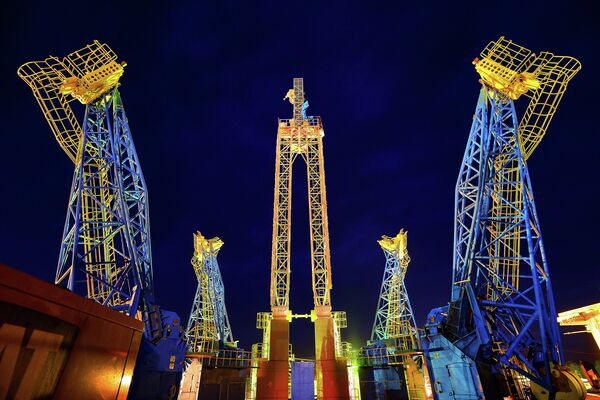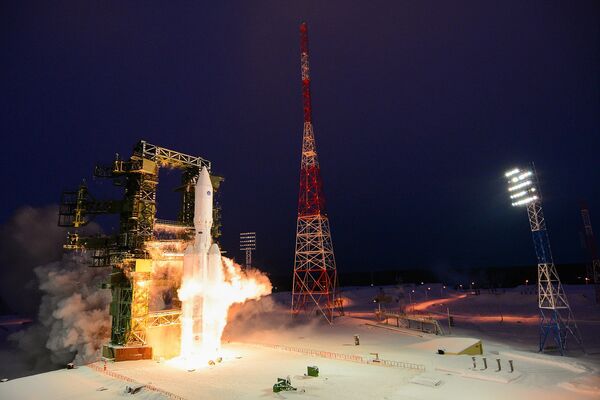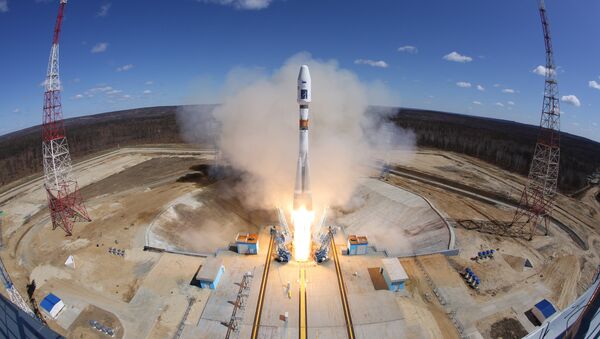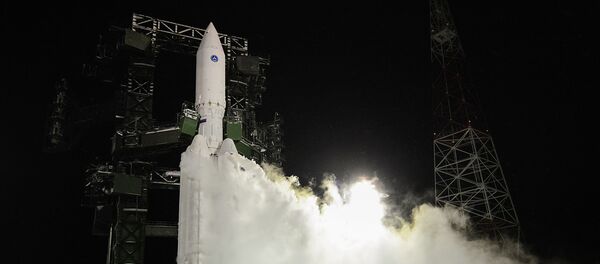Russia will soon stop launching its military satellites from the Kazakhstan-based Baikonur cosmodrome, and with good reason, RIA Novosti contributor Andrei Stanavov writes.
On Wednesday Russian Deputy Prime Minister Dmitry Rogozin announced that the first technological equipment for the launch of the Angara heavy-lift carrier rocket has been delivered to the Vostochny Space Center in Russian Far East.
"The first technological equipment for the Angara has arrived. It is in the assembly and testing facility," Rogozin told reporters at a meeting at the Vostochny cosmodrome.
According to the head of Russia's Roscosmos State Space Corporation, Igor Komarov, the corporation is ready to launch a modernized Angara-A5M super-heavy carrier rocket from the Vostochny cosmodrome in 2021.
"While the launching of manned spacecraft carrying international crews and commercial satellites from the Baikonur [spaceport] looks rather innocuous, the situation with the Defense Ministry's vehicles is different: launches [of military spacecraft] from the territory of another state appear to be an extreme measure," the journalist elaborated.
It seems logical that a country like Russia must have guaranteed access to space from its own domestic launch site and to be able to bring a vast range of payloads, including military ones, to the orbit, Stavanov added.

Commenting on the issue, Moscow's Space News magazine editor Igor Marinin expressed confidence that once Angara-A5M goes into service at the Vostochny spaceport, the Russian Ministry of Defense will leave Baikonur.
"Today a profound modernization of all space vehicles, including military ones, is underway. I am sure that in the coming years the Defense Ministry will receive the latest secret heavy satellites, which are intended to be launched from a new energy-efficient spaceport," Marinin told RIA Novosti, in a reference to the Vostochny Space Center.
Marinin explained that the Russian military is currently using Baikonur because some of their heavy satellites couldn't be brought to the geostationary orbit from the Plesetsk cosmodrome.

The expert added that the Plesetsk spaceport can't completely replace Baikonur because of its geographic location.
"During the launches from Plesetsk the carrying capacity of Angara is lower, because its [Plesetsk] northern location does not allow [the rocket] to use the Earth's rotation moment for an effective cast," Marinin said, adding that in this particular respect the location of Vostochny — which is built only 6 degrees to the north of Baikonur — is far superior.
During the 13th International Aviation and Space Salon MAKS-2017 in the Russian city of Zhukovsky, this July Igor Komarov revealed that Roscosmos State Space Corporation will construct the launch pad for heavy Angara rockets at the Vostochny Space Center with the assistance of the Russian Defense Ministry.
"It is expected that the Angara-A5, which is capable of bringing 24.5 tons to low earth orbit, will become Russia's main heavy rocket both for both civilian and military purposes," Stanavov emphasized, "Despite the difficult background, this [space-launch vehicle] is unique: this is the first carrier rocket developed from scratch in Russia, and not inherited from the USSR."
The Angara family of space-launch vehicles is designed to provide lifting capabilities of between 2 and 40.5 metric tonnes into low Earth orbit.
An important feature of the Angara carrier rocket is its ecological safety: the space-launch vehicle uses oxygen-kerosene engines. In comparison, the Proton-M rocket is fueled with highly toxic heptyl.
The Angara's modular design is also viewed by experts as its competitive advantage while composite materials and plastic reduce the weight of the rocket and simplify its design.
However, experts believe that the most important thing the Angara could boast is the RD-191 engine, which is one of the best in the world, the RIA Novosti contributor underscored.



